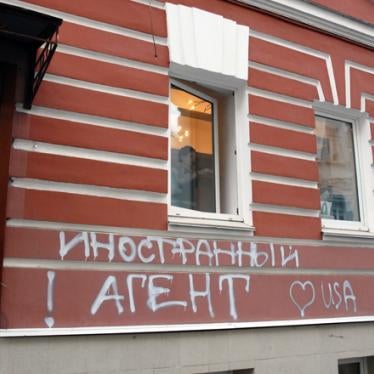(Moscow) – The European Union (EU) should press Russia’s leadership at the EU-Russia summit to end the crackdown on civil society. The 31st summit meeting since the two sides started meeting regularly will be held on June 3 and 4, 2013, in Ekaterinburg.
“The crackdown is threatening civil society,” said Hugh Williamson, Europe and Central Asia director at Human Rights Watch. “The EU has spoken out strongly in recent months, but now is the time to directly call on Russia’s leadership to revise restrictive laws and stop the harassment of independent groups.”
The centerpiece of the government crackdown is a new law requiring nongovernmental organizations that accept foreign funding and engage in “political activity” to register as “foreign agents.”
Since March, the government has inspected hundreds of groups across Russia, including the Human Rights Watch Moscow office, as part of a massive campaign to force targeted organizations to register as “foreign agents.”
The government has filed administrative complaints against at least 6 groups, ordered at least 15 others to register or face administrative charges, and warned another 28 to register as “foreign agents” if they plan to carry out “political activities” or to receive foreign funding, based on a list compiled by Human Rights Watch.
Among the organizations targeted are Memorial, one of Russia’s oldest and most prominent human rights groups, and the Levada Center, an independent polling group.
“The authorities are seeking to define ‘political’ so broadly as to make any involvement in public life that is not controlled by the government off-limits,” Williamson said. “They are also trying to tarnish groups with the ‘foreign agents’ label, which in Russia can only mean ‘spy.’”
Russia’s permanent representative to the EU, Ambassador Vladimir Chizhov, said in a news conference on May 23 that Russia respected the EU’s interest in human rights in Russia, but that such issues should be discussed at the human rights consultations held twice annually between the EU and Russia. He said it would be “difficult to imagine” the purpose of raising human rights at the summit, except to “poison the atmosphere.”
“It’s the government’s crackdown that threatens to poison the atmosphere at the summit, not discussion of it,” Williamson said. “Russia is a key strategic partner for the EU, so it’s important for human rights to be discussed at the highest level. The EU should say why ending the crackdown is fundamental to the EU’s relationship with Russia.”







